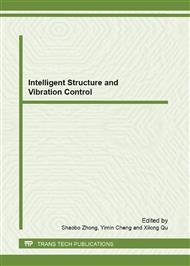p.293
p.298
p.304
p.309
p.314
p.319
p.323
p.328
p.333
Experimental Study on Collaborative Work Performance of Multi-Functional Vibration-Absorption Structure to Enclosing Wall
Abstract:
Multi-functional Vibration-absorption Structure to Enclosing Wall (MVEW) is a new type of vibration absorption technology. In the structure, by the combination of frame filled wall, TMD and vibration absorption system, advantages of each part are used. To understand collaborative work performances of MVEW in minor earthquakes, 1/2 scale model of MVEW with two layers and one span is designed, and be carried out under three work situations(frame structure ,100mm and 200mm thickness enclosure wall), and monotonous lateral load tests were carried out. The result indicates that the shearing force bear by enclosing wall increase as the height increasing, similarly, it decrease by height increase for frame column. As the existing of enclosing wall, the stiffness and bearing capacity of MVEW are stronger obviously than frame structure. And when brittle compressive components are set at the top and bottom of the wall, the lateral force bear by the wall will be higher obviously than only setting (brittle compressive components) at the top of the wall, which showing that the wall will bear more lateral load by increasing touch point between enclosing wall and the column.
Info:
Periodical:
Pages:
314-318
DOI:
Citation:
Online since:
February 2011
Authors:
Price:
Сopyright:
© 2011 Trans Tech Publications Ltd. All Rights Reserved
Share:
Citation:


